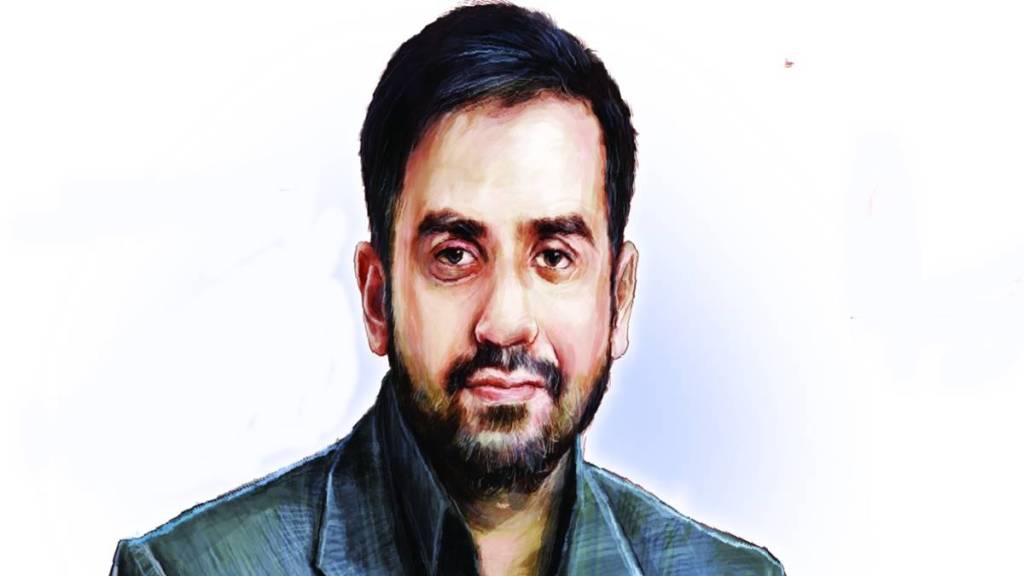Nikhil Kamath, the billionaire philanthropist, and co-founder of Zerodha, joined Amitabh Shah, founder, Yuva Unstoppable at its upgraded school. This is the third chapter of Financial Express and Yuva Unstoppable’s initiative to get achievers to interact with thousands of government school children. Kiran Mazumdar-Shaw of Biocon and BK Sister Shivani of the Brahma Kumari spiritual movement were the first two.
Kamath says that once the idea of giving away money is cool, a lot more can be changed in society. Kamath was speaking with Shah of Yuva Unstoppable at an event showcasing the work of the foundation in helping underprivileged children with their studies and careers.
“Unique, dynamic, and a kind entrepreneur” – this is how Shah introduced Kamath at the event. Kamath is one of India’s wealthy young entrepreneurs who have signed up for the Young India Philanthropic Pledge – where young Indians below the age of 45, who have a net worth of over $100 million, have agreed to pledge 25 percent of their wealth to charity. Kamath has also signed the Giving Pledge founded by Bill and Melinda Gates and Warren Buffet. He is the fourth Indian to do so after Azim Premji, Kiran Mazumdar-Shaw, and Nandan and Rohini Nilekani.
Says Kamath, “We are who we are today based on our friends and society, based on capitalism, based on the government and our upbringing. The current logic is holding on to money is cool. Capitalism is cool. The idea is to go to younger people who have gotten lucky by virtue of where they are at that point of time and start giving vocally. The idea is, if the narrative changes, from holding money is cool to giving money away and being part of the community is cool, a lot more will change in society. It won’t be an independent, individual task, but it will happen when many people come together and influence society which is capitalistic today.”
When Shah quizzed about what makes Kamath appear so calm, despite the ups and downs of the stock markets, he said he emotes much less than most people. He points out that one of that one has to understand themselves and their flaws.
While talking about Yuva Unstoppable Kamath mentioned “in this world of giving the biggest task is to find a bridge who you can trust” and the great thing is that he crossed that bridge through his friendship with Amitabh Shah a while ago.
“No human is truly ever altruistic. I think the big evolution that happens in life is to understand how you’re flawed as a human being and how you’re not altruistic. I think if figuring out what your flaws are is step one, I’m trying to achieve step one today.”
So, what inspires Kamath to give? How did he get involved with the Young India Philanthropy Pledge? Kamath quotes French philosopher Rene Girard, who wrote about mimetic theory, saying, “If I was born in a box, and I grew up in that same box and had no outside influences. I would grow up maybe not wanting anything and maybe being a completely different kind of person.”
He is quick to add that it’s all a virtue of where you stand in society today, where it makes giving easier. “It’s a hard thing to say, but for somebody who is earning Rs 10,000 a month, it is 100 times harder for that person to give away Rs 1,000, than say somebody who is earning 100 times that much, who can give up a lot more. It’s a factor of how lucky you have been in your journey.”
Kamath, who started his career nearly two decades ago, working in a call centre when he was 17, says he doesn’t think he would be talking of giving had he continued there earning much less. He says it’s totally a “factor of circumstance.”
So, what made Kamath switch to setting up a business that made trading in stocks affordable? “I’ll be very candid and honest,” he says. “I feel 95 percent of all that is said by people like us is bull**** online. There was no insight. There was no big plan. We were trading. We were traders. We paid a lot in fees. I’m talking 17-18 years ago, we would pay up to maybe 3-4 percent in brokerage fees. So, one day we sat down and thought if we become brokers ourselves, we will save this much money. And that was it. Everything else has been one happy accident after another.”
When asked what differentiation he sees technology bringing to people’s lives in the future, Kamath says he sees productivity going up significantly by virtue of technology.
“I feel we will move to a kind of world where there will be a universal basic income, people will have enough to eat, have homes, hospitalization, education, and society maybe will split into a combination of socialism and capitalism. People who are happy with that much will have that much. People who want to go out and do more can choose to do more.”
Kamath says the two qualities he admires most in people are: One, is the ability to just be nice. And the second is that people should be more aware of their own flaws.
“We are not these pictures and images we have of ourselves or we try to project upon society. I have my own flaws. I’m not saying you need to work and change how you’re flawed. But I wish people were more aware of their flaws because that will make them nicer.”
Kamath also had a few words of advice for the school students present at the event. He asked them not to stress too much about exams as many more opportunities would present themselves, to take the opportunity to learn as much as they can from the Internet, and finally to “just chill out a bit more.”

